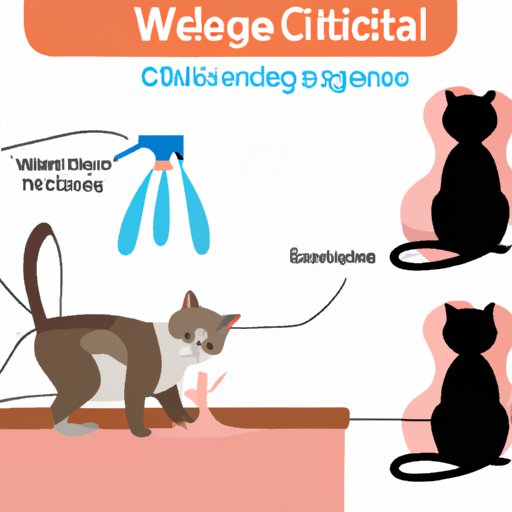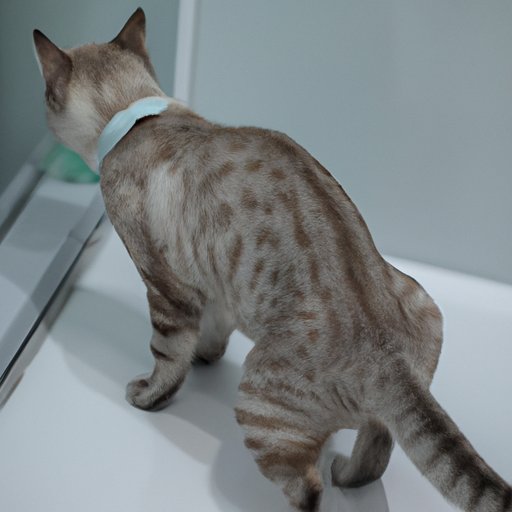I. Introduction
As a cat owner, you may have experienced the frustration of finding your male cat peeing outside of the litter box. This behavior can be both unpleasant and worrisome as it can signify an underlying health or behavioral issue. In this article, we will explore the causes of male cat spraying and urination, prevention tips, behavioral training techniques, home remedies, health issues that may cause the behavior, and when to seek veterinary help.

II. Causes of Male Cat Spraying and Urination
When a male cat sprays or urinates outside of the litter box, it is often a sign of an underlying issue. Here are some of the most common causes:
A. Medical Issues
Urinary tract infections, kidney stones, and other health conditions can cause your male cat to urinate outside of the litter box:
1. Urinary tract infections
Urinary tract infections are a common cause of inappropriate urination in male cats. Symptoms may include straining to urinate and urinating in inappropriate places. If you suspect your cat has a urinary tract infection, seek veterinary help immediately as untreated infections can lead to more serious health problems.
2. Kidney stones
Kidney stones can cause painful urination and the urge to urinate more frequently. While not common in cats, kidney stones can be a serious health issue and require immediate veterinary attention.
3. Other health conditions
Other health conditions, such as diabetes, hyperthyroidism, and bladder stones, can also lead to inappropriate urination in male cats. Be sure to monitor your cat’s behavior for any other signs of illness or discomfort.
B. Stress
Stress can also cause your male cat to spray or urinate outside of the litter box. Some common stressors may include:
1. Changes in the household
New pets, new people, or a change in routine can cause stress for your cat. Be sure to give your cat plenty of time to adjust to any changes and provide them with a comfortable, quiet space to retreat to if they feel anxious.
2. Anxiety
Anxiety in cats can manifest in many ways, and one of those ways is stress-related inappropriate urination. If you suspect your cat is suffering from anxiety, talk to your veterinarian about potential solutions.
3. Territorial marking
Male cats may spray to mark their territory, which is a natural behavior. However, if the behavior is out of control, there may be an underlying issue that needs to be addressed.
C. Other Potential Causes
In addition to medical issues and stress, other factors that may cause male cats to spray or urinate outside of the litter box include:
1. Litter box issues
Make sure your cat has access to a clean, well-maintained litter box and that there are enough boxes for all of the cats in your household. Additionally, pay attention to the type of litter you are using and the location of the boxes.
2. Aging
As cats age, they may become less interested in using the litter box. Be sure to provide your senior cat with a comfortable, easily accessible box and monitor their behavior for any signs of discomfort.
3. Behavioral problems
Some cats may simply have behavior issues that need to be addressed through training or other means.
III. Tips for Preventing Male Cat Spraying and Urination
Preventing male cat spraying and urination requires a multi-faceted approach. Here are some tips:
A. Providing an Adequate Number of Litter Boxes
Ensure that all of your cats have access to a clean litter box and that there are enough boxes for all of them. As a rule of thumb, have one more litter box than the number of cats in the household.
B. Reducing Stress
1. Playtime and exercise
Playing with your cat and providing regular exercise can help reduce stress. Encouraging your cat to engage in playtime with interactive toys and games can also help reduce stress and keep them mentally stimulated.
2. Special pheromone sprays
Special pheromone sprays can help reduce stress in cats and may be helpful in preventing inappropriate urination.
C. Addressing Territorial Marking
1. Neutering
Neutering your male cat can help reduce the urge to mark territory through spraying.
2. Marking problem areas
Keep an eye on where your cat is urinating and mark those areas to discourage future spraying. You can use aluminum foil, tape or other materials that the cat does not like.
D. Monitoring Food and Water Intake
Make sure your cat is eating and drinking regularly and that they have access to fresh water. Keep their water bowls and food dishes clean.
IV. Behavioral Training for Male Cats
Training your male cat to use the litter box can be a helpful solution if behavior is contributing to their spraying or urination. Here are some training tips:
A. Positive Reinforcement Methods
1. Rewards for Using the Litter Box
Offer your cat treats or praise every time they use the litter box correctly.
2. Teaching the Cat to Associate the Litter Box with Positive Experiences
Make the litter box a pleasant, comfortable place for your cat to be. Add extra blankets or pillows, and keep the area clean and well-maintained.
B. Redirecting Negative Behavior
1. Catching the Cat in the Act
If you catch your cat in the act of spraying or urinating, interrupt them with a loud noise or clap and immediately take them to the litter box to finish.
2. Using Deterrents
If your cat continues to spray or urinate outside of the litter box, consider using a deterrent spray or noise machine.
V. Home Remedies for Male Cat Spraying and Urination
Alongside veterinary care and behavior training, home remedies may be effective in controlling male cat spraying and urination. Here are some natural remedies:
A. Natural Remedies
1. Apple Cider Vinegar
Apple cider vinegar is a natural deterrent for cats, and spraying the areas with a mixture of vinegar and water may prevent future spraying.
2. Herbal Supplements
Herbal supplements such as catnip, chamomile, and valerian root can help calm your cat and may reduce stress and anxiety.
B. Over-The-Counter Products
1. Litter Additives
Litter additives that neutralize odor can help prevent spraying and urination outside of the litter box.
2. Odor Eliminators
Special odor eliminators may be helpful in removing the scent of cat urine from problem areas, discouraging future spraying in those spots.
VI. Health Issues that Cause Male Cat Spraying and Urination
It’s important to be aware of the health issues that may cause your male cat to spray or urinate outside of the litter box:
A. Urinary Tract Infections
Urinary tract infections may cause your male cat to experience pain or discomfort during urination.
B. Kidney Stones
Kidney stones may cause your cat to feel an increased urge to urinate and may be accompanied by pain or discomfort.
C. Other Health Conditions
Other health conditions such as diabetes, hyperthyroidism, and bladder stones may also contribute to inappropriate urination or spraying.
D. Symptoms to Look Out for
Monitor your male cat’s behavior for signs of discomfort, frequent urination, discolored urine, or increased thirst.
VII. When to Seek Veterinary Help for Male Cat Spraying and Urination
It’s important to seek veterinary help if your male cat is persistently spraying or urinating outside of the litter box:
A. Sudden or Persistent Changes in Behavior
If you notice sudden or persistent changes in your cat’s behavior, such as increased spraying or urination, seek veterinary help. It is critical to address the problem before it becomes more serious.
B. Other Concerning Symptoms
If your cat has additional symptoms such as discolored urine, blood in the urine, or an increased amount of urination, contact your veterinarian right away, as these could be signs of a serious health issue.
C. Potential Treatments
Your veterinarian may prescribe medication or other treatments depending on the underlying cause of your male cat’s spraying or urination issues.
VIII. Conclusion
Dealing with a male cat that is spraying or urinating everywhere can be both frustrating and worrying. However, many causes can be traced to specific medical or behavioral issues that can be treated with veterinary care, behavioral training and home remedies. Be proactive, as taking steps to resolve the issue will prevent potential health problems and will create a more harmonious household environment for both you and your cat.
